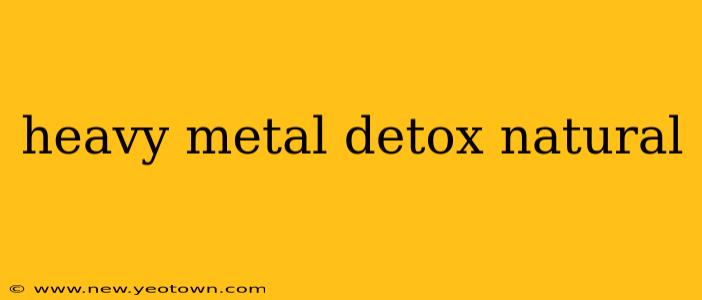Heavy metals. The very words conjure up images of industrial pollution and toxic waste. But the reality is, we're all exposed to them, to varying degrees, through our food, water, and even the air we breathe. These insidious invaders can accumulate in our bodies over time, potentially leading to a range of health issues. This isn't a scare tactic; it's a call to action. Let's explore how nature provides powerful allies in our quest for a heavy metal detox.
What are Heavy Metals and Why Should I Care About Detoxing?
Before diving into the natural detox methods, let's understand the enemy. Heavy metals are elements with high atomic weights and densities, such as mercury, lead, arsenic, cadmium, and aluminum. They're not naturally processed by our bodies; instead, they accumulate in tissues and organs, interfering with vital bodily functions. Symptoms of heavy metal toxicity can be subtle and varied, ranging from fatigue and headaches to neurological problems and even organ damage. The severity depends on the type of metal, the amount of exposure, and individual factors.
What are the best natural ways to detox heavy metals?
This is the million-dollar question, and there’s no single magic bullet. Instead, a multifaceted approach, incorporating lifestyle changes and the strategic use of natural substances, is most effective. Let's explore some of the most promising natural paths:
1. Cilantro and Chlorella: The Dynamic Duo
Often touted as heavy metal chelators, cilantro and chlorella work synergistically. Cilantro, a common herb, is believed to bind to heavy metals, facilitating their elimination. Chlorella, a type of green algae, is rich in chlorophyll, which acts as a powerful detoxifying agent, further aiding in the removal of these unwanted guests. While research is ongoing and more robust studies are needed, anecdotal evidence and some preliminary findings support their use in supporting natural detoxification processes.
2. The Power of Plants: Fruits and Vegetables Rich in Antioxidants
Antioxidants, found abundantly in colorful fruits and vegetables, act as protectors against oxidative stress, which is often exacerbated by heavy metal toxicity. Think berries (blueberries, strawberries), leafy greens (kale, spinach), and cruciferous vegetables (broccoli, cauliflower). These are not just healthy additions to your diet; they’re actively contributing to a healthier internal environment, making it easier for your body to manage and eliminate toxins.
3. Hydration is Key: The Importance of Water
This might seem simple, but adequate hydration is fundamental to detoxification. Water helps flush out toxins through urination and sweating. Aim for at least eight glasses of purified water daily.
4. Supporting Your Liver and Kidneys: Nature's Filters
Your liver and kidneys are your body's natural detox organs. Supporting their function is crucial. Milk thistle, known for its liver-protective properties, and dandelion root, which can support kidney function, are natural allies in this process. Always consult with a healthcare professional before using herbal supplements.
5. Binders: Supporting Natural Elimination
Certain substances can act as binders, trapping heavy metals in the digestive tract and facilitating their excretion. Activated charcoal, bentonite clay, and zeolite are often mentioned in this context. However, it's essential to research thoroughly and consult with a healthcare professional before using them, as improper use could have unintended consequences.
What foods should I avoid for a heavy metal detox?
While focusing on adding detoxifying foods is crucial, reducing exposure to heavy metals through diet is equally important. Avoid processed foods, which may contain high levels of heavy metals due to contamination during processing or packaging. Opt for organic produce to minimize pesticide exposure, a potential source of heavy metals. Similarly, limit consumption of fish high in mercury.
Can I detox heavy metals at home?
Many of the methods discussed above can be implemented at home. However, it's important to emphasize that a natural detox is a supportive measure, not a cure-all. If you suspect you have significant heavy metal toxicity, seek professional medical advice and testing. A healthcare professional can assess your individual needs and recommend appropriate interventions. They might suggest more advanced detoxification methods under their supervision.

